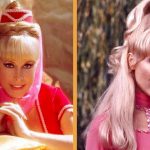Jean Stapleton played the beloved gullible and amicable Edith Bunker on CBS’s All in the Family. For her work on that program, she takes home three Emmy Awards while nominating for a total of 8. Impressively, she also won two Golden Globes for Best Actress in a comedy series for her contribution to the series.
All in the Family wouldn’t have been the same without Edith Bunker. Her perpetually optimistic attitude was the perfect counterbalance to Archie’s gruff pessimism. She could be a bit flighty at times, her naivete could be her downfall and her voice sure was shrill – especially when she would utter her trademark ‘Oh, Aaaaaarh-chie!’ catchphrase – but she held the family together and proved to be the perfect foil to her husbands inflated ego and insensitive defiance.
Archie Bunker’s Place
Stapleton stayed with the show throughout all nine of its seasons starting in 1971. When All in the Family wrap up in 1979, she continues her role in the spin-off series Archie Bunker’s Place but kills off the show after only 5 episodes – leaving many fans to wonder what happened.
In a second, we’ll talk about her character’s death and what was going on behind the scenes that prompted it, but first, we should explore a little bit more about who Jean Stapleton was and how she ended up becoming one of the most memorable sitcom characters of the 20th century.
She didn’t find fame untill she was in her 50s. It’s actually really fascinating how long it took for her to finally catch a big break, but that just goes to show you that perseverance pays off.
Jean Stapleton’s Early Years
She was born in Manhattan on January 19, 1923, to an Irish household. The daughter of opera singer Marie A. Stapleton and billboard ad salesman Joseph E. Murray, Jean Stapleton started out in life through relatively humble means.
It seems as if show business was a tradition of sorts in her family. Her uncle Joseph Deming performed in vaudeville stage shows and her brother Jack Stapleton was a theater actor. Actress Betty Jane Watson was also one of her cousins.
Stapleton attended Wadleigh High School and continued her education at Hunter College. She worked briefly as a secretary before deciding that she too wanted to become an actress like many in her family were. When Jean was 18, she made her stage debut in the off-Broadway play American Gothic.
Soon enough she found her way on to cast roles of Broadway musicals like Funny Girl, Juno, Damn Yankees and Bells are Ringing. The latter two productions willd see her reprising her roles when they bring to the big screen in 1958 and 1960 respectively.
Making The Jump To Television
Some of Stapleton’s first television roles included appearances on Starlight Theater, Robert Montgomery Presents,Omnibus, Repertory Theater Woman With A Past, and My Three Sons. All these parts were relatively small, and for quite some time, she could only find relatively unremarkable work taking the form of bit parts, guest appearances, and nothing more substantial.
Interestingly, in 1962, she guest-starred in an episode of The Defenders alongside her future co-star Carroll O’Conner.
For the next several years she appears on another handful of TV series like Dennis The Menace, The Jackie Gleason Show, and Car 54, Where Are You?. She also co-starred in 4 films. Something Wild, Up the Down Staircase, Cold Turkey, and Klute.
Finally Finding Stardom
Even though Stapleton had been acting since she was a teenager, she didn’t become well-known until she joined the cast of All in the Family in 1971. Norman Lear – who is somewhat of the Godfather of sitcoms – receives another hit on his hands and American audiences can’t get enough of it. After almost a decade, Stapleton finally had found what she wanted all along – that is steady work and to have her talents recognized.
The show sets in a middle-class neighborhood in Queens. Edith means to be the voice of reason to counteract Archie’s backward views and disdain for the political and social changes that are happening in the late 60s and early 70s. She became one of the most important characters not only in All in the Family but in all of Norman Lear’s shows. Audiences absolutely adored her, despite her lack of sophistication and propensity for misspeaking. Even with her limited education and vernacular, she was able to cut through Archie’s thick shell and get him to reconsider his short-sighted ways. As such, she inadvertently became a symbol of change, a voice for women’s rights, and an advocate for progressive idealogy.
Character At The Center Of The Earth
Many of the show’s most timely moments came when her character was at the center of the stage. In many different ways, All in the Family explored issues never before seen on the television screen. It pushed boundaries and opened up doors and Edith was the perfect character to break down some of those walls that were well overdue for dismantling.
For example, In season two, Edith went through menopause and then in season eight, she was nearly the victim of sexual assault. When Edith discovers a lump on her breast in the 1973 episode ‘Edith’s Christmas Story’, women all across the country move to go have mammograms done. Yes, Edith may actually have saved a few lives.
Hey, by the way, if you’re digging this video so far, make sure you show us a little support by tapping the like button and subscribing to our channel. And make sure you keep watching if you want to find out exactly why Jean Stapleton wanted to call it quits
Eventually, She Wanted Out
There is a certain kind of double-edged sword that comes with being a TV star on a popular program. On the one hand, you have a reamarkably wide audience and your work can be appreciated in living rooms all across the continent, but the flip side of the coin is the unfortunate reality where at-home viewers and tinseltown producers begin to solely associate you with the actor you play on-screen. After being on a series for quite some time, you become completely typecast, and finding other work can be difficult.
When All in the Family came to a close in 1979 and Archie’s Bunker Place premiered in the fall of that same year, she agreed to reprise her role, but she found out very quickly that she really didn’t want to keep playing the same character that she had already spent almost a decade embodying.
Stapleton knew that if she ever wanted to play any other role than Edith Bunker, she would have to make an exit from that part before it was too late. So after filming five episodes of the series, she called up Norman and told him that she wanted out.
Someone He Loves For 9 Years
At first, after she told him her wishes, he was completely silent – speechless even. Then he replied reluctantly with something to the effect that saying yes to that request would be very difficult. Stapleton reminded him that Edith was only a fictional character and that it wasn’t like she was actually going anywhere.
He quickly replied by saying that she wasn‘t fictional. To Lear, she is more than just a character in one of his shows. To him, she is family – someone he knows and loves for 9 years, but despite this fact, he obliges Stapleton’s request and agrees to kill her character off.
The Washington Post did an interview with Stapleton shortly after the news broke that Edith was going to die. They asked her if she felt any sadness about the departure. She replied by saying that she really didn’t feel anything about it at all. To her, Edith wasn’t someone that could die, because she will forever live in the memories and imaginations of fans and through the countless reruns that will keep her alive in syndication for years to come.
She explains that a painter isn’t satisfying with painting the same piece over and over for their whole life. Such an existence would lose it’s meaning and would become so very unstimulating. Her decision to move on was about finding new challenges, taking on new goals, and expanding her repertoire.
Her Death Was Coupled With A Good Cause
Lear always was an advocate for many different social and political causes. When Edith died, he wanted to make sure that her death wasn’t for nothing, so his production company created the Edith Bunker Memorial Fund and contributed $5,000,000 to it. The fund was created to raise awareness for the Equal Rights Amendment and Women’s rights.
It was the first time in history that such a fund was created in memory of a fictional character from a TV show. Lear expressed that he created the fund because he felt like the ERA represents everything that Edith Bunker was all about.
In later episodes of All in the Family, she would stand up to Archie’s hardheadedness and bigotry and audiences ate it right up. Even though Stapleton was not much of a feminist in her own personal life, Edith became a symbol of that movement. She represented a challenge to the patriarchal status quo.
Audiences Didn’t Mind Her Leaving
Of course, nobody wanted Edith Bunker to die. When she passed away from a stroke in the season 2 premiere ‘Archie Alone’, there is no denying that some serioulsly major heartstrings were pulled – and Archie, of course, was the one to take the news the hardest.
Despite the fact that she was one of All in the Family’s most beloved characters, when she finally was phased out of Archie Bunker’s Place after season 1, the ratings didn’t take a hit. Even without Edith, the program was able to outshine competing shows in its time slot. It clobbered Mork and Mindy, NBC’s Sunday night movies, and ABC’s Tenspeed and Brownshoe.
While not quite as popular as its predecessor, Archie Bunker’s Place went on for 4 seasons before finally coming to a close.
Television Hall Of Fame
Stapleton went on to get her wish. No longer was she confined to playing a submissive housewife. She went on to have several dozen of TV appearances and guest-star roles and starred in a number of TV films before finally retiring in 2001. A year later, she was inducted into the Television Hall of Fame.
Well, that wraps up another facts-packed video. We can’t really blame somebody for not wanting to be typecast for their entire life, although it is worth noting that Stapleton never found another role as big as Edith Bunker. That’s got to be the hardest part about being on TV. People associate you with the person that they see each week on their television screens – so even after you move on, that’s still how most folks view you. That’s why some actors tend to gravitate towards film instead.
Would you rather be a TV star or a film star? Let us know what you think down in the comments section.
And if you’ve enjoyed this video, make sure you give it a like and subscribe to our channel. Tap the bell icon to turn on notifications so you can keep up with all of our latest videos.





